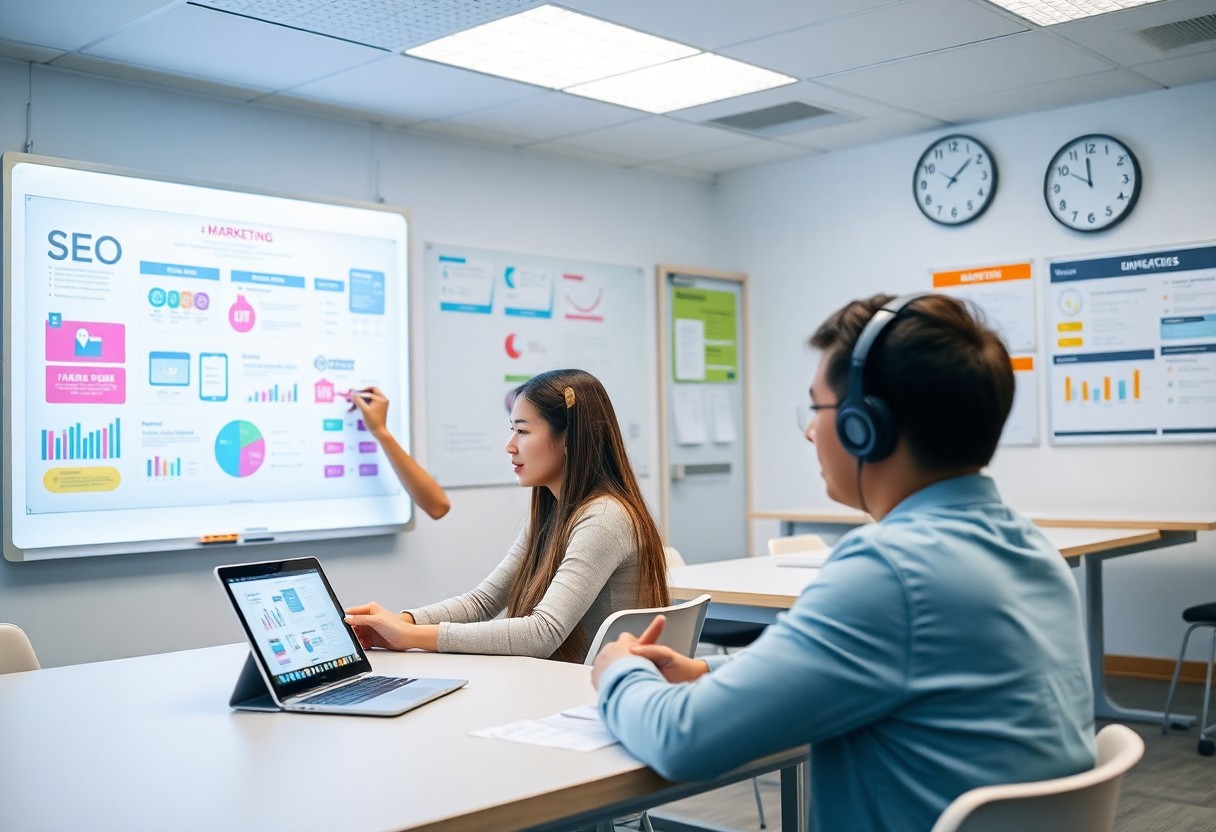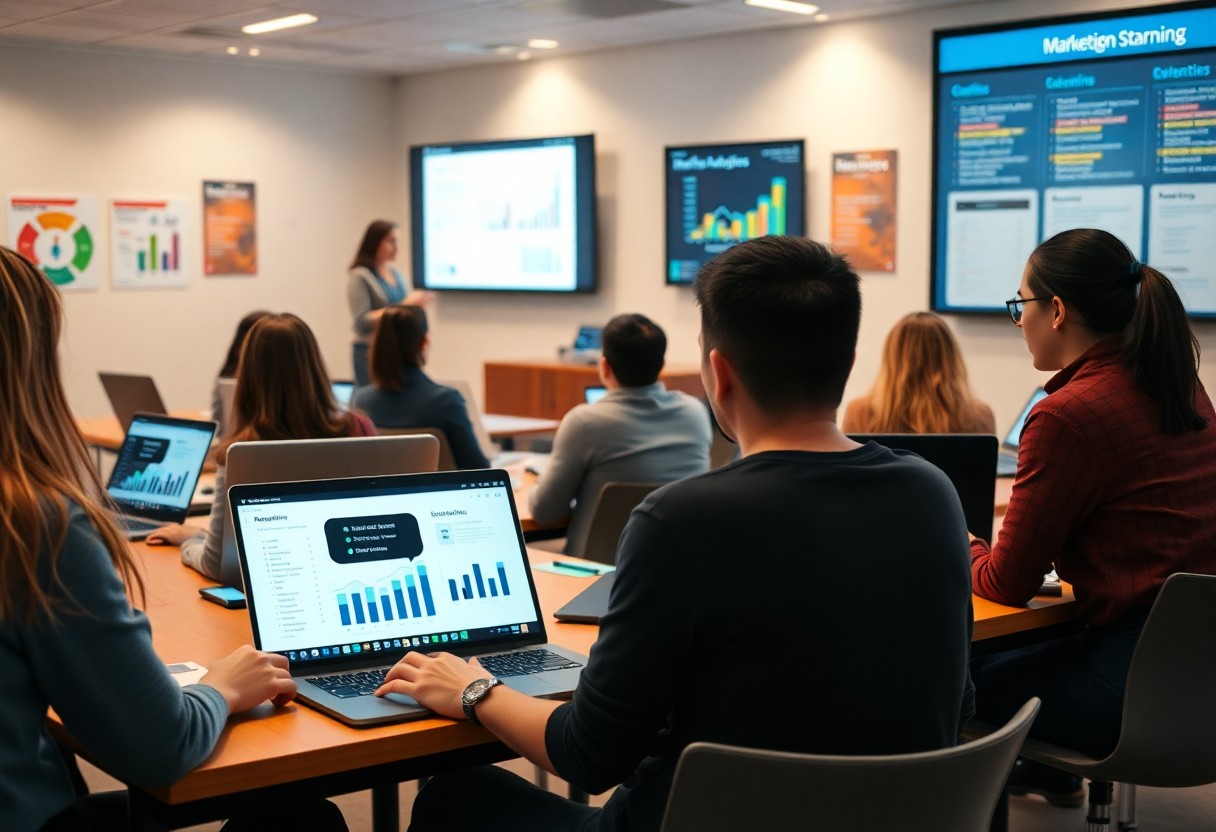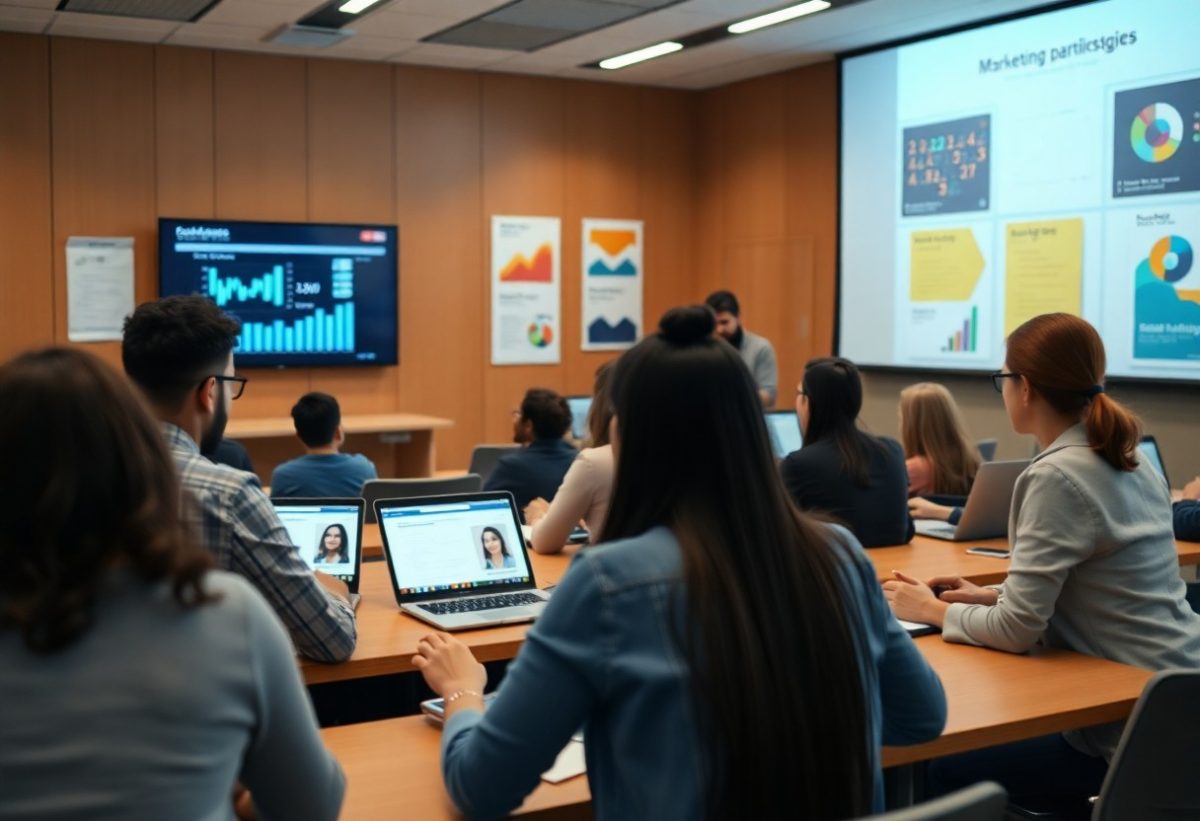Marketing education is evolving, and you stand at the forefront of this transformation. Hybrid learning courses are emerging as powerful tools that blend traditional classroom learning with online flexibility, equipping you with the dynamic skills needed in today’s fast-paced landscape. By embracing these innovative programs, you can enhance your marketing acumen, adapt to changing trends, and position yourself as a knowledgeable leader in your field. Explore how this approach could redefine your journey toward becoming a marketing savant.

The Rise of Hybrid Learning
Hybrid learning is reshaping educational landscapes, blending traditional classroom instruction with online learning methodologies. This dual approach not only enhances the learning experience but also caters to diverse student needs, leading to increased engagement and better outcomes. As educational institutions adapt to this versatile model, it’s clear that hybrid learning is poised for growth, especially in fields like marketing, where agility and innovation are paramount.
Definition and Overview
Hybrid learning combines face-to-face teaching with online activities, allowing for a flexible and personalized educational experience. This model maximizes the strengths of both methods, providing opportunities for direct interaction and collaborative learning alongside independent study. In marketing courses, leveraging digital platforms while maintaining personal connections enriches the learning environment.
Benefits of Hybrid Learning in Education
The shift to hybrid learning offers various advantages, notably flexibility, accessibility, and diverse engagement methods. You can choose your learning schedule, allowing for a balance between commitments, and access resources from anywhere, accommodating different learning styles. The combined approach fosters deeper understanding through interactive activities and real-time feedback.
Hybrid learning’s flexibility not only accommodates various schedules but also promotes increased participation. Studies indicate that students in hybrid environments often outperform their peers in traditional settings, with a 20% increase in retention rates. Real-world case studies show that marketing students engaging in hybrid courses develop vital skills such as adaptability and critical thinking, vital for success in today’s fast-paced digital landscape. The integration of technology enhances creativity and collaboration, preparing you to navigate complex marketing challenges effectively.
Marketing Skills for the Future
Innovative marketing strategies require a new set of competencies. You need to master data analysis, content creation, and digital marketing tools to stay relevant. As consumer behavior evolves with technology, skills such as social media management, SEO fluency, and a strong understanding of AI applications become non-negotiable. Adaptability and creativity enhance your ability to craft compelling narratives that resonate with diverse audiences.
Essential Skills for Modern Marketers
Proficiency in analytics empowers you to interpret data effectively, guiding decision-making and strategy. Content creation skills enable you to produce engaging materials tailored for various platforms. Digital marketing expertise, including paid advertising and social media engagement, positions you to maximize outreach. Additionally, soft skills like communication and collaboration are vital for successful team dynamics and client interactions.
How Hybrid Learning Addresses Skill Gaps
Hybrid learning fills skill gaps by combining flexible online resources with hands-on, real-world experiences. You can engage with interactive content, participate in simulations, and collaborate in virtual teams, all while benefiting from direct mentorship. This approach allows you to develop practical skills at your own pace, ensuring a deeper understanding of complex marketing concepts and tools.
Through hybrid learning, you gain access to diverse resources tailored to your individual learning style, whether through video lectures, interactive workshops, or online forums. This flexibility allows for consistent skill development, even amidst your busy schedule. Additionally, many programs incorporate project-based learning, giving you the chance to apply theoretical knowledge to practical scenarios, enhancing retention and competence. By addressing the varied learning needs of future marketers, hybrid models effectively prepare you for the dynamic landscape of modern marketing.

Case Studies: Success Stories in Hybrid Learning
Hybrid learning has shown promising results in cultivating marketing talent, evidenced by several success stories from institutions embracing this model. Schools have reported increased enrollment, improved retention rates, and successful job placements, reflecting the effective integration of online and face-to-face interactions.
- University A: 30% increase in enrollment in hybrid marketing courses over two years.
- College B: 90% student satisfaction rate, with a 40% completion boost compared to traditional courses.
- Institute C: 75% of hybrid program graduates secured marketing roles within three months.
- University D: 50% higher engagement levels in hybrid courses, as indicated by course evaluations.
Institutions Leading the Way
Several institutions have set benchmarks in hybrid learning, notably University A and College B, both implementing state-of-the-art technology and innovative curricula. These leaders also prioritize creating a collaborative environment that merges the best of online resources with in-person mentorship, resulting in significant improvements in student outcomes and market readiness.
Student Outcomes and Success Metrics
Hybrid learning models have directly contributed to enhanced student outcomes, with metrics illustrating their effectiveness in real-world applications. Students experience increased engagement, skill mastery, and networking opportunities that pave the way for career success. Transitioning from theory to practice, graduates often exhibit greater proficiency in digital marketing tools as employers increasingly prioritize hands-on experience.
Institutions leveraging hybrid learning strategies have reported notable metrics. For instance, a study revealed hybrid marketing graduates are 60% more likely to possess relevant digital marketing skills compared to their peers from traditional programs. Moreover, job placement rates for hybrid learners surged to 80%, confirming the model’s effectiveness in preparing you for a competitive landscape. Enhanced interaction with industry leaders through webinars and workshops further accelerates your transition into the workforce, showcasing the tangible benefits of a hybrid approach to education in marketing.
The Role of Technology in Hybrid Learning
Technology fundamentally transforms hybrid learning, providing a dynamic landscape where traditional and digital methods converge. Online platforms facilitate resource sharing, instant feedback, and diverse learning pathways, all vital for modern marketing education. You benefit from a variety of multimedia resources, enhancing your understanding and retention of complex marketing concepts. By integrating technology into your learning routine, you position yourself at the forefront of an evolving industry, ready to adapt to new trends and tools.
Tools and Platforms Available
Numerous tools and platforms enhance your hybrid learning experience, including Learning Management Systems (LMS) like Canvas and Moodle, which centralize course materials and assessments. Collaboration tools such as Slack and Zoom allow real-time communication and interaction, while analytics platforms track your progress and engagement levels. Social media platforms further enable networking and community building among peers. By leveraging these resources, you can tailor your learning journey to fit your needs and preferences.
Enhancing Learning Engagement through Technology
Engagement is vital in hybrid learning environments, and technology plays a pivotal role in fostering it. Interactive elements like quizzes, polls, and discussion forums make learning more participatory. You can access videos and simulations that illustrate real-world marketing scenarios, reinforcing theoretical principles through practical application. Thought-provoking case studies and gamified learning experiences keep you engaged while deepening your understanding of marketing strategies.
Incorporating technology keeps you actively involved in your coursework, reinforcing concepts through hands-on activities and discussions. For instance, using online simulations allows you to apply marketing theories in real-time scenarios, providing immediate feedback on your decision-making. Communities formed in virtual discussion rooms lead to richer exchanges of ideas and collaborative problem-solving. Tools like video conferencing enable guest speakers from the industry to share insights, broadening your perspective and enhancing your learning experience. Ultimately, these technological enhancements cultivate a more engaging and effective learning environment tailored to your success in the marketing field.
Challenges and Considerations
Hybrid learning does present several challenges that both educators and students must navigate for optimal results. Issues such as technology accessibility, student engagement, and varied learning paces can impede progress. Additionally, there may be inconsistencies in the quality of online content compared to traditional instruction. These hurdles require thoughtful strategies to ensure that hybrid courses truly benefit aspiring marketing professionals.
Potential Drawbacks of Hybrid Learning
One significant drawback of hybrid learning is the risk of disconnect between online and in-person interactions. This can lead to feelings of isolation among students, reducing overall motivation. Moreover, not all students thrive in a self-directed learning environment, which can create disparities in knowledge retention and skill acquisition. Technical difficulties can further exacerbate these issues, undermining the effectiveness of the learning experience.
Strategies for Overcoming Challenges
Implementing structured communication channels is vital for bridging gaps between online and in-person interactions. Regular check-ins, collaborative group projects, and robust support systems can facilitate deeper engagement and connection among students. Additionally, providing technical training and resources reduces barriers to access, enabling students to maximize their hybrid learning experience. Incorporating a mix of synchronous and asynchronous content also caters to diverse learning preferences, fostering better outcomes.
Utilizing tools like discussion boards, chat platforms, and virtual office hours enhances real-time interaction, helping maintain a sense of community. Front-loading technical training ensures all students possess the necessary skills to navigate online platforms confidently. By encouraging peer collaboration through project-based work, you can create accountability and foster a supportive learning environment. Furthermore, continuous feedback loops allow you to adjust teaching methods as needed, ensuring that all students progress equally and effectively within the hybrid model.
Preparing for the Future of Work
As the workplace evolves, adapting your skills to meet emerging demands is vital. Hybrid learning courses offer a flexible approach that aligns with the changing job market, enabling you to enhance your expertise without sacrificing your current commitments. By immersing yourself in both digital and in-person learning environments, you cultivate a diverse skill set that prepares you for new opportunities and challenges.
Industry Trends in Marketing
Staying informed about industry trends can sharpen your marketing strategies significantly. Current data shows that digital marketing roles are projected to grow by 10% over the next decade. With the rise of AI, social media, and data analytics, understanding these tools and trends positions you to craft effective campaigns that resonate with targeted audiences.
The Importance of Lifelong Learning
Lifelong learning strengthens your adaptability in an ever-changing job landscape. Continuous education enables you to stay updated with industry developments, ensuring your skill set remains relevant and competitive. Organizations value employees who proactively seek growth opportunities, making your commitment to learning a significant asset in advancing your career.
Statistics reveal that professionals engaged in lifelong learning are 30% more likely to secure promotions compared to those who don’t. Seeking courses, attending workshops, or pursuing certifications demonstrates initiative and a desire to excel. For marketers, this means not just keeping pace with changes but becoming leaders who can innovate and influence trends, paving the way for future achievements and opportunities in the field.
Conclusion
The potential of hybrid learning courses to shape future marketing experts lies in their flexibility and accessibility, enabling you to tailor your education to fit your unique needs. By combining theoretical knowledge with practical experience, these courses empower you to develop critical skills imperative for success in a rapidly evolving industry. Embracing this innovative learning model can provide you with a competitive edge, equipping you with the tools to thrive in your marketing career and adapt to ever-changing market dynamics.

